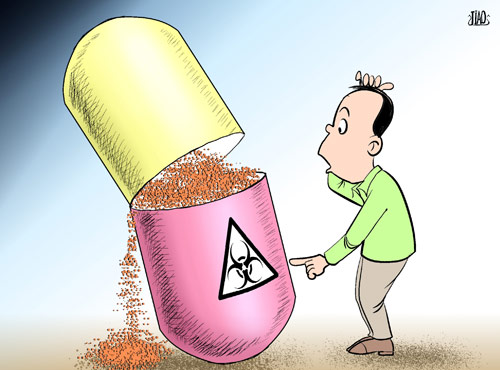All must swallow bitter pill to tackle capsule ills
- By He Shifei
 0 Comment(s)
0 Comment(s) Print
Print E-mail China.org.cn, April 25, 2012
E-mail China.org.cn, April 25, 2012
|
|
|
By the cover [By Jiao Haiyang/China.org.cn] |
"You are a Nigerian, and only you can change Nigeria."
So said outgoing World Bank President Robert Zoellick in response to a question from a Nigerian priest at the World Bank annual Spring Meetings on Thursday, challenging the World Bank's role in promoting social accountability. Zoellick continued: "But we can make the case that social accountability and social contracts can lead to better results and better programs."
At Thursday's meeting, Zoellick argued for "democratized development" in which the sustainable development of a society involves collaborative engagement from the public, private, and social sectors.
Citing China as a positive example, Zoellick accredited the country's notable development to two main factors: The fact that it has made progress in a "decentralized fashion", and that it had "learnt from experience".
However, 8,000 miles away, the Chinese people are learning a new lesson about food and drug safety.
Since last Sunday, April 15, China's State Food and Drug Administration (SFDA) has been investigating a pharmaceutical scandal revealed by China Central Television (CCTV). The reports said that several domestic drug capsule manufacturers had been caught making drug capsules with industrial gelatin retrieved from discarded scraps of leather. According to the reports, the capsules were contaminated with excessive levels of chromium.
Unconfirmed reports followed that a score of yogurts and puddings could also have been tainted.
The appalling scandal points directly to loopholes in government regulations and law enforcement. According to experts in the field, current regulations only require that drug authorities inspect the quality of drugs' active ingredients, while no specific rule currently exists to control the quality of medicine capsules.
At a local level, provincial and municipal governments have been so negligent that they failed to discover the widespread use of toxic ingredients, especially in Ru Ao, a small town in eastern China's Zhejiang Province dubbed "the hometown of capsules", due to the fact that it produces one-third of all drug capsules sold in the Chinese market.
The private sector faces a more serious charge. Capsule manufacturers, despite being aware that "the gelatin is dirty", would simply heat it and then add strong chemicals to disguise the greasiness. These profit-seeking firms took a short cut because of a 60 yuan (approximately 10 US dollars) discrepancy in the cost of raw materials. Yet, they dismissed the fact that consuming these capsules could damage people's heath, and even cost lives.
There is widespread agreement that governments and firms should be held responsible for what happened. But few noticed that there is another missing piece of the jig-saw puzzle: What is the role of the social sector in this scandal? Is there any monitoring mechanism or even pressure from civil society?
No civil society organization placed small manufacturers or law enforcement agencies under closer scrutiny after the outbreak of the capsules scandal. Only a few media outlets questioned major dairy brands after looking through the financial records of the suspended gelatin suppliers.
So, what of the public? Many people, having been panicked and angered by news of the scandal, are trying to figure out ways to consume medicines without swallowing capsules, and there are online calls for the resignation of the head of the SFDA. Some vocal opinion leaders are organizing a boycott of dairy companies suspected of using industrial gelatin. And some news articles have mentioned that the websites of some dairy brands have been hacked.
It is obvious that all three parts necessary for holistic sustainable development, namely the social, public and private sectors, are failing to adequately meet their responsibilities.
Especially glaring is the absence of that glue of society, the social contract. The public's energy is not well coordinated or delegated. It takes all - engagement, accountability, and leadership - for civil society to thrive.
As President Zoellick said to the Nigerian priest: "I do not have the magic wand to change every country. It is your own choice to make changes." Zoellick is right. We must all become engaged to ensure the production of quality drug capsules, healthy dairy products and a vibrant society.
He Shifei is a Chinese freelance journalist currently living in the U.S. Her research interests include government, politics and policy studies.
Opinion articles reflect the views of their authors, not necessarily those of China.org.cn






